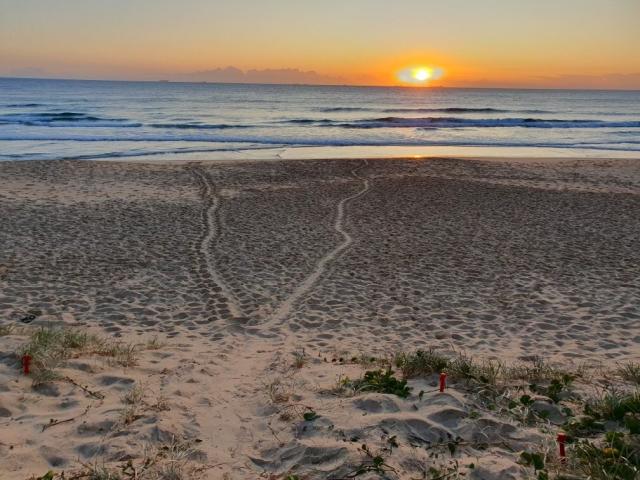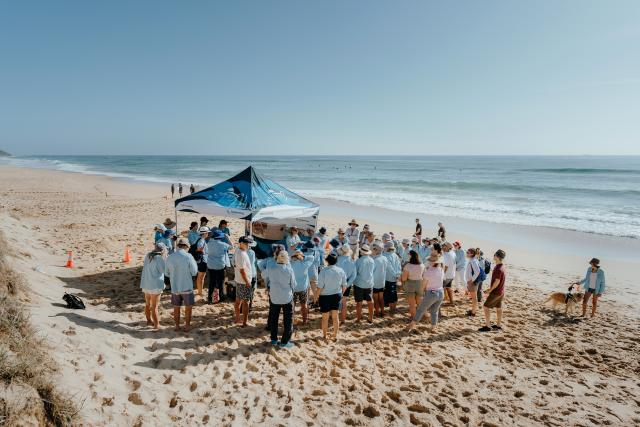It’s been an egg-cellent start to the Sunshine Coast turtle nesting season, with six nests laid in seven days.
At sunrise on Friday 25 November, expert citizen scientist and Turtle Care volunteer Lesley Dimmock spotted the first turtle tracks on Buddina beach.
This was followed by two more nests recorded on the weekend, another two on Tuesday and one on Wednesday.
Once the volunteers find the egg chamber, the next step is to install special mesh over the nest to prevent predators getting access.
Sunshine Coast Council’s TurtleCare Conservation Officer Kate Hofmeister said the volunteers were very excited the season had officially begun.
“More than 250 turtle volunteers across the Sunshine Coast are expecting to see turtle tracks during their early morning local beach patrols any day now,” Ms Hofmeister said.
“However, even though we’ve had a big start to the season, we are expecting less nests this year due to the extended La Nina weather pattern we’ve been experiencing since 2020.
“There have also been a few unsuccessful nesting attempts recently which could be related to the poor condition of the dunes, again due to this year’s weather.
“These situations do happen, and it’s a reminder that nesting turtles are easily disturbed, so we ask our community to please give the turtles lots of space if they come across one on the beach at night time.
“The volunteers from TurtleCare and Coolum and North Shore Coast Care updated their skills at annual training in mid-November so they can continue to perform the valuable citizen scientist role of protecting nests and collecting data on the endangered species.”
Mrs Hofmeister highlighted the importance of residents turning off any unnecessary external lighting at night.
“Sea turtles are not often found nesting in areas of high population density, so we are very lucky to have these ancient mariners still coming to our shores on the Sunshine Coast each summer, especially when you consider sea turtles have been nesting here for thousands of years,” Mrs Hofmeister said.
“This year’s hatchlings have a one in 1000 chance of surviving to adulthood, and if they do, they will return to start nesting on Sunshine Coast beaches in the year 2052.
“Adult and hatchling turtles are highly sensitive to artificial light. A dark beach is the best way to attract nesting turtles to local beaches and allow the hatchlings to make their own way to the ocean.
“We have seen, on a number of occasions, the negative and disorienting impacts lights can have on turtle nesting, so it is important we all work together to protect these majestic creatures.
“Turtle nesting season is a time when the whole community can come together as a turtle-friendly community to celebrate and help protect these threatened species.
“We can all help by keeping plastic waste out of waterways and beaches and cutting the glow of lights after 8pm during nesting and hatchling season.”
To report turtle tracks, new nests and emerging hatchlings on the southern end of the coast, call Sunshine Coast Council’s Turtle Care hotline 0437 559 067 or for sightings from Mooloolaba north, call Coolum and North Shore Coast Care on 0403 370 157.
Find out more about our marine turtles, the TurtleCare volunteer program and the tracking projects on council’s website by searching TurtleCare or Google TurtleCare Sunshine Coast.










